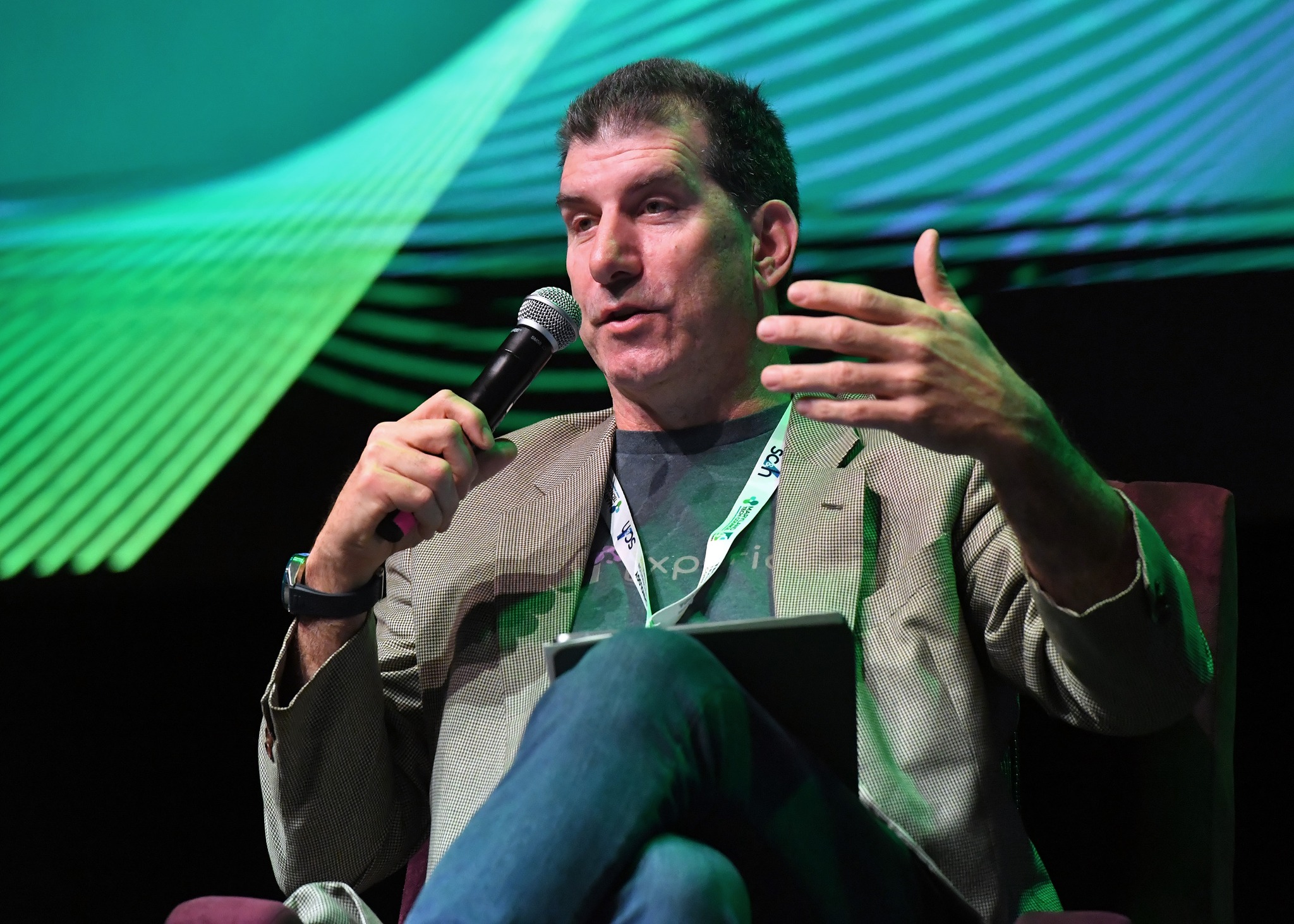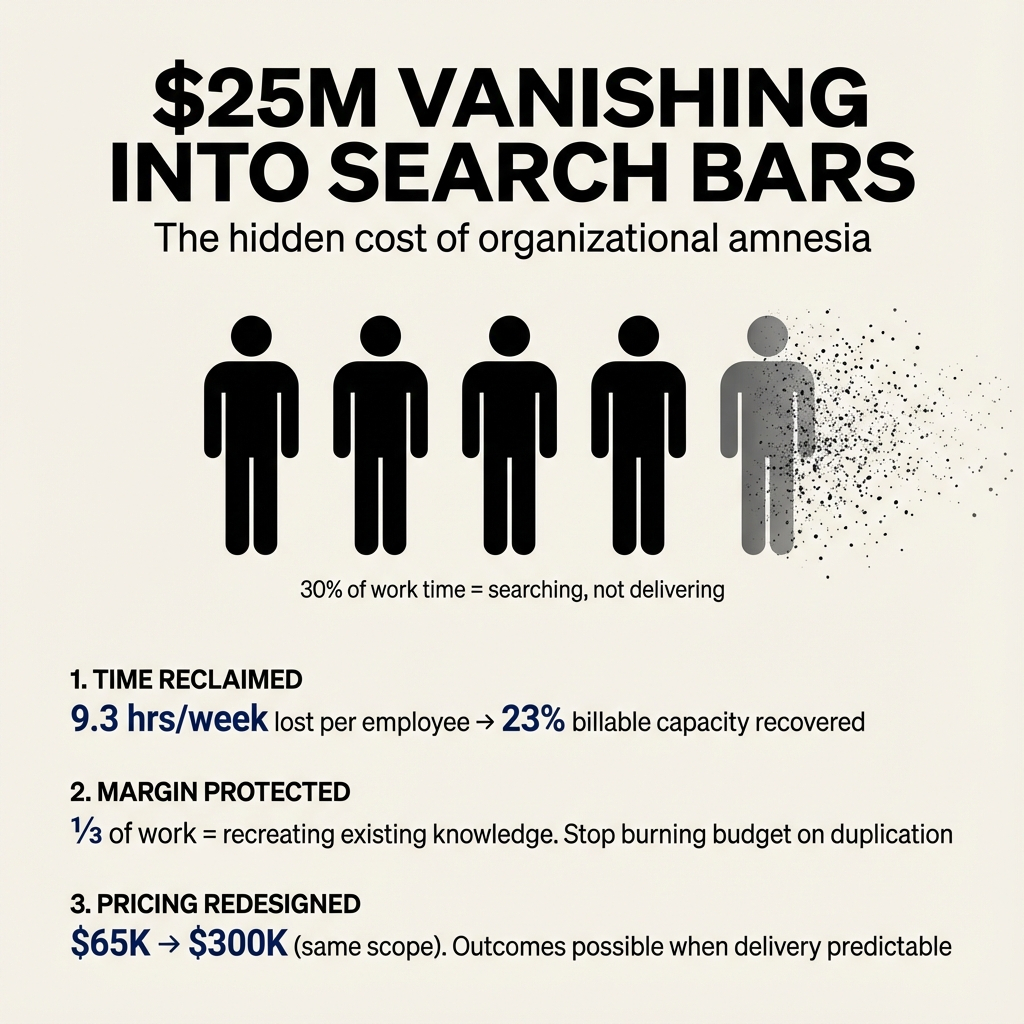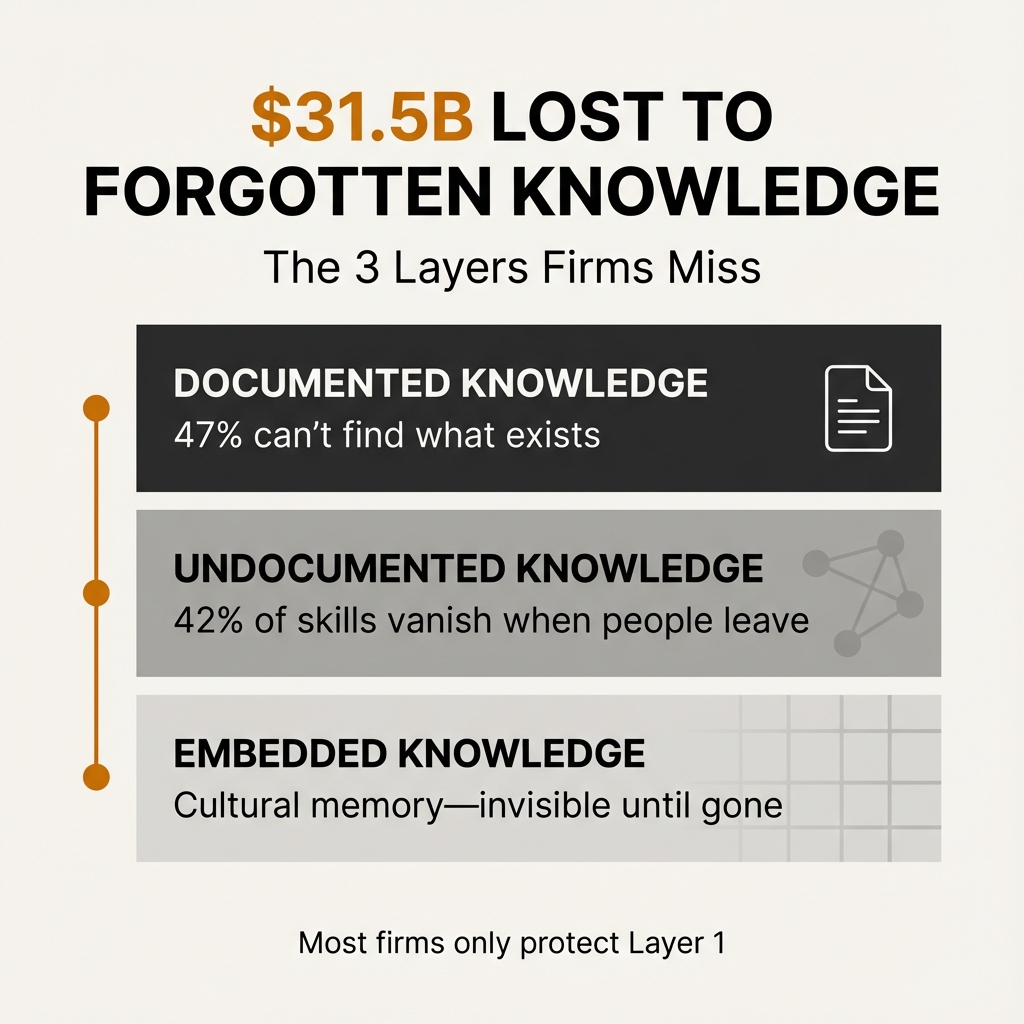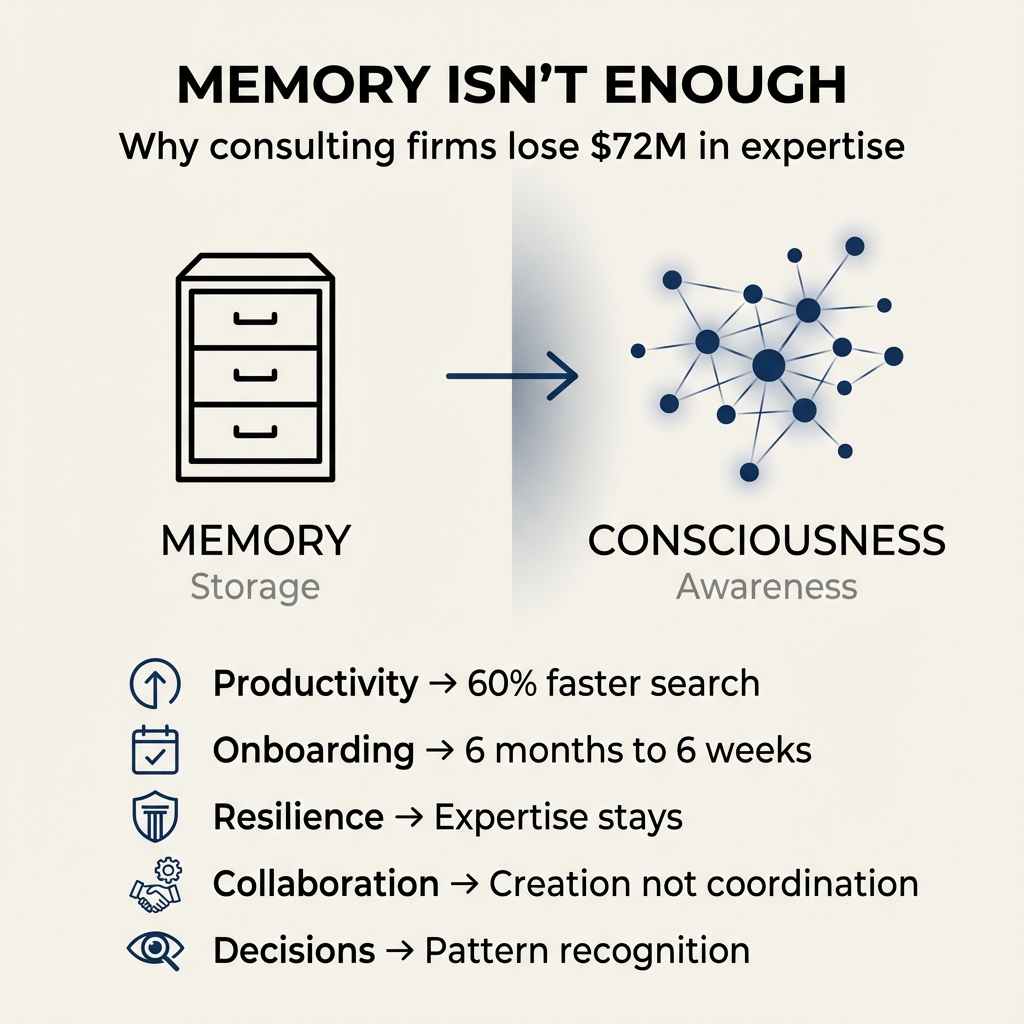DATE
CATEGORY
READING TIME
The Memory-Driven Consulting Revolution

After 30 years in consulting, I've witnessed the same painful scenario play out countless times. A project team staffed with new members starts work without realizing the exact problem was solved five years ago. They reinvent the wheel, spend 40% more time than budgeted on a fixed-price project, and struggle to deliver on time. The client grows frustrated, margins evaporate, and everyone wonders how we got here.
This isn't a knowledge management problem. It's an organizational memory crisis.
Why Traditional Knowledge Management Has Failed Consulting
Let's be honest about why knowledge management initiatives fail in consulting firms. They rely on humans to manually curate, enrich, and repurpose past artifacts. But consultants are already racing to the next project. Even with rewards in place, critical knowledge gets lost in the shuffle.
When I grew Portal Solutions from startup to 55 consultants, we implemented a process for project close-outs to document, extract, and curate deliverables. It sounded great in theory. In practice, it was another burden on already overextended teams.
Organizational memory represents a fundamentally different approach. It doesn't rely on human curation. Instead, it taps into all digital content across your firm, both structured (transaction systems, CRM, ERP, time and billing) and unstructured (document management systems, communication platforms like Slack or Teams, and semi-structured systems like Confluence and Jira).
For consulting firms drowning in data and wasting up to 30% of their time navigating scattered information, establishing robust organizational memory isn't optional. It's essential for survival.
The Hidden Costs of Reinventing the Wheel
Clients hire consultants for their institutional knowledge. When you can't demonstrate that knowledge, you become irrelevant and client satisfaction plummets. I've faced this reality firsthand when a client told me: "We hired you because you've done this before, but your team is struggling to get it done." The team hadn't looked back to see how we'd solved similar problems before.
The financial impact is significant. We absorbed non-billable hours to deliver on our promises. But the damage extends beyond project margins. It affects your reputation, team morale, and ability to win future work.
Beyond the obvious costs, there are hidden penalties:
- Hard-to-find and recall experiences
- Expertise that isn't clearly articulated and is difficult to locate
- Proposals that take too long to write because finding similar previous projects is challenging
- New staff limited to their immediate peers rather than tapping the larger firm network
- Knowledge lost when someone leaves due to lack of formal capture
- Siloed knowledge that team members don't see the value in sharing
These costs compound over time, creating an unsustainable business model in an increasingly competitive market.
Transforming Junior Consultant Onboarding
Imagine your junior consultants having direct access to your firm's private knowledge with an agent ready to answer any questions about experience, expertise, methodology, and other important artifacts. They quickly become productive and operate with the knowledge of your most senior people.
This isn't fantasy. It's what organizational memory enables.
The traditional consulting model requires years to develop expertise. Junior consultants learn through apprenticeship, gradually absorbing knowledge from senior team members. But this model breaks down when:
- Teams are distributed across locations
- Senior consultants are overextended
- Project timelines are compressed
- Client expectations for immediate expertise are high
Organizational memory flattens the expertise curve. New hires can contribute at levels that previously required years of experience. They still need to develop judgment and client relationship skills, but they're no longer handicapped by lack of access to the firm's collective knowledge.
The Intellectual Property Paradox
Consulting firms face a fundamental paradox: their most valuable asset walks out the door every evening. The knowledge, expertise, and insights that clients pay for reside primarily in consultants' heads.
Organizational memory offers the solution. It creates a comprehensive, searchable dataset of your organization's knowledge and expertise, including proposals, projects, deliverables, skills, outcomes, and learnings. It's not merely a static repository but a dynamic, evolving resource that grows and adapts as your organization learns and changes.
This isn't about replacing consultants. It's about amplifying their capabilities and preserving their contributions. When a senior consultant leaves, their knowledge doesn't disappear. It remains accessible to everyone who follows.
Beyond Efficiency: Creating Space for Innovation
The true power of organizational memory goes beyond efficiency. It creates space for what consultants do best: thinking strategically and innovating.
By automating the retrieval and application of past knowledge, organizational memory frees consultants to focus on higher-value activities. They can win more work by producing more proposals. Project teams can concentrate on strategy rather than searching for information. They can repurpose existing work while using generative AI to brainstorm alternative approaches.
The time gained unleashes consultants to do what humans excel at: brainstorming innovative approaches and thinking strategically. This shift from mechanical tasks to high-value thinking doesn't just improve efficiency. It transforms the nature of consulting work itself.
Client Relationships Reimagined
Organizational memory transforms client relationships in three critical ways:
First, by tapping into your expertise repository, you ensure more consistent delivery. You can reuse what's there and deliver consistently according to standards. This eliminates the variability that often plagues consulting engagements where different teams deliver wildly different experiences.
Second, you can use organizational memory to compare your work to standards and ensure alignment. AI agents can perform this quality control function, flagging deviations and suggesting improvements before deliverables reach clients.
Third, you gain a real-time pulse on client feedback and status, allowing you to anticipate problems before they arise. This proactive approach to client management strengthens relationships and improves satisfaction.
The result is a more consistent, high-quality client experience regardless of which consultants are assigned to the engagement.
The AI Partnership Model
AI agents are integral to effective organizational memory systems. They solve real problems by understanding your intent. For example, a compliance agent can monitor and review deliverables to ensure they meet expected outcomes and results.
These agents supplement and enrich project teams, allowing consultants to delegate tasks and focus on client relationships. They're not replacing humans but enhancing their abilities.
The partnership between consultants and AI agents creates a new operating model for consulting firms. Consultants provide judgment, creativity, and relationship management. AI agents provide information retrieval, pattern recognition, and quality control.
Together, they deliver more value than either could alone.
Overcoming Resistance to Organizational Memory
Implementing organizational memory systems requires overcoming significant barriers:
- Recognizing the need for collaboration and knowledge sharing
- Agreeing to connect all digital content sources
- Investing time to change and evolve business models
- Reinventing work processes
- Understanding that AI enhances human abilities rather than replacing them
The key is starting small. Don't try to solve everything at once. Pilot, test, and deploy systems incrementally. Evaluate buy versus build options based on your specific needs and resources.
The firms that overcome these barriers will separate themselves from competitors. They'll deliver more value at lower cost while creating more fulfilling work for their consultants.
The New Consulting Operating System
Organizational memory isn't just another digital transformation initiative. It's the foundation for a new consulting operating system that will determine which firms thrive and which fade into irrelevance.
This new operating system enables firms to:
The consulting firms that embrace this new operating system will gain sustainable competitive advantage. Those that don't will find themselves increasingly unable to compete on either quality or price.
The choice is clear. The time to act is now. The memory-driven consulting revolution has begun.







